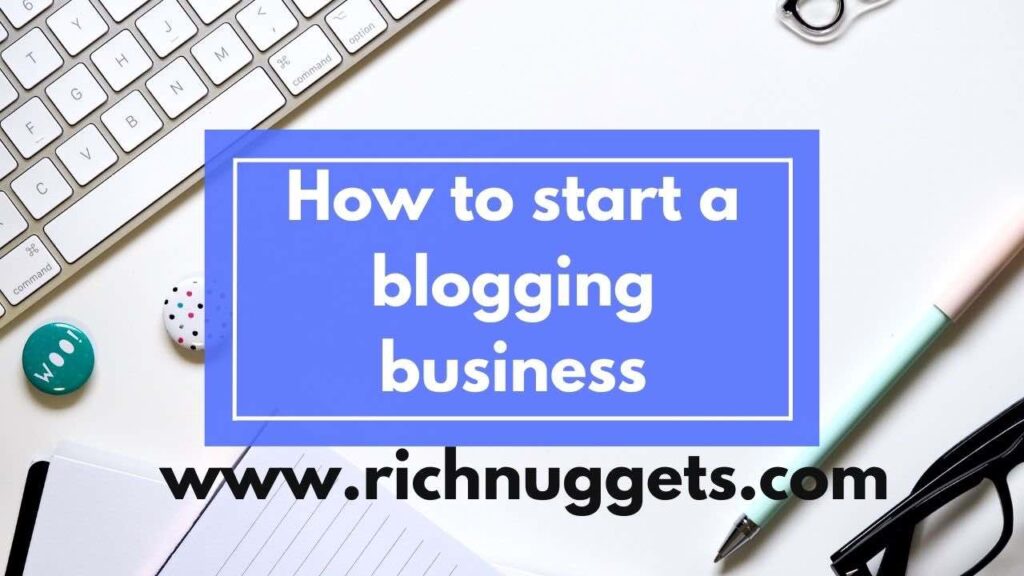
A blogging business is a venture that leverages the power of blogging to generate income and build a profitable online enterprise. Unlike personal blogs that primarily focus on self-expression and sharing thoughts, a blogging business is oriented towards entrepreneurship, with the goal of monetizing the content and turning the blog into a sustainable source of revenue.
In today’s fast-paced digital age, blogging has transcended its origins as a mere online journal and transformed into a potent avenue for entrepreneurship and self-expression. With millions of blogs spanning a multitude of niches, it’s undeniable that blogging has become an influential force in the online realm.
Whether you dream of becoming a travel influencer, a tech guru, a food critic, or a fashion connoisseur, blogging offers a platform to voice your thoughts, build a community of like-minded individuals, and even generate a substantial income. But, like any business venture, starting a blogging business requires careful planning, dedication, and a pinch of tech-savviness.
Table of Contents
How Do Bloggers Make Money?

Bloggers have a myriad of ways to make money from their blogs, thanks to the diverse opportunities presented by the online world.
Here are some of the most common methods bloggers use to make money:
- Advertising: They advertise on their blog using platforms like Google AdSense, Media.net, PropellerAds, Revcontent, or they work directly with ad networks or brands. Bloggers earn money either based on the number of ad impressions (CPM) or clicks (CPC) the ads receive.
- Sponsored Content: This is when Bloggers collaborate with brands or companies to create sponsored posts or reviews in their content and receive payment or free products.
- Affiliate Marketing: This is also a popular method of making money through blogging by joining affiliate programs and promoting products or services of other companies through affiliate links that gives you a percentage as commission on every successful sale.
- Digital Products: As simple as selling their own digital products, such as ebooks, online courses, templates, or software.
- Physical Products: Selling physical products related to their niche. This could include merchandise, handmade items, or products they source and resell.
- Memberships and Subscriptions: Offering premium or exclusive content to paying members through membership or subscription models.
- Freelance Writing and Services: A successful blog can establish a blogger as an expert in their niche, leading to opportunities for freelance writing or consulting services for other businesses or websites.
- Events and Workshops: Hosting events, workshops, or webinars related to their niche, charging attendees for participation.
- Donations and Crowdfunding: Some bloggers offer the option for readers to support them through donations or crowdfunding.
It’s important to note that value to readers should always be the primary focus, as loyal and engaged readers are more likely to support a blogger’s income-generating efforts.
How to start a blogging business

Step 1. Choose a Profitable Niche
A niche refers to a specific topic, subject, or area of interest that your blog will focus on. Choosing a profitable niche is the first and most important step when starting a blogging business. It’s essential to select a niche that not only resonates with your passions and expertise but also has the potential to attract a significant traffic and generate income.
To aid in your research for relevant keywords connected to your chosen niche, you can leverage powerful keyword research tools like SEMRUSH and Ahref. These tools are considered top-notch in the industry, although they come with a price tag. However, if you prefer a free alternative to explore the perfect niche with a respectable search volume, utilizing AI tools such as ChatGPT and Bard Ai can certainly be sufficient.
Below is an example of keyword suggestions generated by Bard Ai
| Niche | Global Search Volume | Keyword Difficulty |
|---|---|---|
| How to | 150,000,000+ | Easy |
| DIY | 75,000,000+ | Easy |
| Tips and tricks | 50,000,000+ | Easy |
| Recipes | 40,000,000+ | Easy |
| Product reviews | 30,000,000+ | Medium |
| Travel tips | 25,000,000+ | Easy |
| Home improvement | 20,000,000+ | Easy |
| Lifestyle | 15,000,000+ | Easy |
| Fashion and beauty | 10,000,000+ | Easy |
When it comes to looking for the perfect niche for your blog you must look into the following key elements, or better said; key factors:
- Passions and Expertise:
- Potential Audience (Traffic)
- Sufficient Demand
- Monetization Opportunities
- Researching Different Niches
- Niche Viability
Remember that choosing the right niche will significantly influence your blog’s success and your enjoyment in the journey.
Step 2: Pick a Domain Name and Hosting
Once you have chosen your niche, the next crucial step is to secure a domain name, register it and host it with a reputable hosting platform.
1. Domain Name and Registration
If you are a new or inexperienced blogger, avoid the mistake of trying to brainstorm a completely new domain name. Instead, consider purchasing an expired domain.
The reason behind this advice is that when you opt for a new domain name, it takes time for Google to recognize and pass relevant authority equity to your blog. However, if you acquire a well-established expired domain, it already possesses a good age authority, Domain authority, and valuable backlinks. This can significantly enhance your blog’s chances of ranking well on Google.
While expired domains can vary in price depending on the seller, you can still find a suitable domain for your niche for less than $100. For example, my mentor purchased an expired domain a few months ago for only $40, and that blog is now generating over $100 in monthly income.
To find the perfect domain name for your niche, you can explore options on expireddomains.net. It’s a valuable resource to help you source the right domain and kickstart your blogging journey with a solid foundation and it is 100% free.
Once you’ve decided on a domain name, register it through a domain registrar. Many registrars offer domain registration services at affordable prices. Registering a domain typically involves paying an annual fee to secure the rights to use that domain.
2. Hosting your Blog
Web hosting is the service that stores your blog’s files, data, and content on a server, making it accessible to visitors worldwide. When choosing your hosting provider, it is compulsory they tick the following boxes;
- Meet Your Blog’s Needs: Assess the hosting requirements of your blog, including anticipated traffic, storage space, and any specific technical requirements related to your chosen CMS (e.g., WordPress).
- Uptime and Reliability: Look for a hosting provider with a high uptime guarantee to ensure your blog remains accessible to visitors at all times. Reliability is essential to maintain a positive user experience.
- Customer Support: A reliable hosting provider should offer excellent customer support to assist you in case of technical issues or questions.
- Security Features: Choose a hosting service that prioritizes security, including regular backups and safeguards against hacking attempts.
- Scalability: Opt for a hosting plan that allows you to easily upgrade as your blog grows and attracts more traffic.
We at StartBizEasy use Hostinger Web Host as it is one of the best hosting platforms globally. After choosing a hosting provider, sign up for a hosting account and follow their instructions to set up your blog. This usually involves linking your domain name to your hosting account and installing your chosen CMS.
Step 3: Set Up and Design Your Blog
Professionally known as Technical SEO (On-Page and Off-Page SEO). It is a critical aspect of optimizing your blog to ensure they are search engine-friendly and can be crawled and indexed effectively. Unlike traditional On-Page SEO, which focuses on content and user experience, On-Page Technical SEO deals with the behind-the-scenes technical elements that contribute to search engine rankings and overall website performance.
Below are the key components of On-Page Technical SEO:
- Customize Themes and Plugins: If it is WordPress you choose as your Content Management System (CMS), you will have access to a plethora of free and premium themes that will determine the look and layout of your blog. Choose a theme that complements your brand and niche. Additionally, explore the vast collection of plugins to enhance your blog’s functionality, such as SEO optimization, spam protection, contact forms, social media sharing buttons, and more; but make sure it is only the relevant plugins that are installed, you don’t want anything slowing down your website.
- SSL Certificate: This enables HTTPS on your blog. This not only ensures secure communication between the user’s browser and your server but is also considered a ranking factor by search engines.
- Website Speed Optimization: Page loading speed might not be a crucial ranking factor as it was in the past, but it still plays a crucial role in getting traffic. Compress images, leverage browser caching, minimize HTTP requests, and use Content Delivery Networks (CDNs) to improve your website’s loading time.
- Mobile-Friendly Design: Design your blog to be responsive and provides an optimal user experience on various mobile devices. Google prioritizes mobile-first indexing, making mobile-friendliness essential for search rankings.
- XML Sitemap: Create and submit an XML sitemap to search engines. This file provides a roadmap of your blog website pages, helping search engine bots crawl and index your content more efficiently.
- Robots.txt: Use a robots.txt file to instruct search engine crawlers on which pages to crawl and which to exclude. This is helpful in preventing indexing of irrelevant or sensitive pages.
- URL Structure: Keep your Blog website URLs clean, concise, and descriptive. Avoid using dynamic parameters in URLs, as they can make indexing challenging for search engines.
- 301 Redirects: Use 301 redirects when you delete or move a page to redirect users and search engines to the updated or relevant page. This helps preserve link equity and prevents 404 errors.
While Off-Page SEO refers to the actions taken outside of your website to improve its visibility and authority in search engine rankings. Off-Page SEO involves common strategies such as; Link Building, Guest Blogging, Social Media Engagement, Social Bookmarking, Online Mentions and Citations, etc.
In other to be safe while engaging in Off-Page SEO, efforts should focus on organic, natural, and high-quality link building. Avoid engaging in black-hat SEO practices like buying links or participating in link schemes, as they can lead to penalties from search engines and harm your website’s reputation.
Technical SEO is an integral part of your overall SEO strategy. By optimizing the technical aspects of your website, you enhance its visibility, crawlability, and indexing efficiency, leading to improved search engine rankings and a better user experience for your audience.
Step 4. Create Valuable Content
Creating valuable content is the heart of any successful blogging business. Because content creation is the heart of the blogging business doesn’t me you should write on anything that crosses your mind. There are principles and guidelines when it comes to writing content for your blogs, they are;
- The content must be High-Quality Content that is unique and original
- It must be Informative and Relevant to your intended readers/audience.
- It should be an Engaging and Appealing Content through the use of storytelling, anecdotes, visuals, and multimedia elements.
- Conduct keyword research to identify relevant and popular search terms within your niche.
- Diversify Content Formats by incorporating videos, infographics, podcasts, and downloadable resources.
- Consistency by publishing weekly, bi-weekly, or monthly, set realistic goals and maintain a regular posting rhythm.
- It should always be Quality over Quantity
By creating valuable, informative, and engaging content that serves your audience’s needs, you establish yourself as a reputable authority in your niche.
Step 5. Promote Your Blog
Promoting your blog is very crucial, especially during the early phase of kicking off, as you really want to grow your audience and build a thriving blogging business within the shortest time.
In promoting your blog there are both free and paid methods you can achieve it. If your budget is limited, it is advisable to opt for the free promotional strategies such as; utilizing social media platforms, email marketing, engaging in online communities and forums, optimizing your content for SEO, seeking collaborations and guest posting opportunities, etc.
On the other hand, if you have a budget for promotion, you can explore paid options like SEO Ads, Social Media Ads, guest posting in Private Blog Networks (PBNs), hosting contests and giveaways, and collaborating with influencers to promote your blog.
By leveraging various channels and engaging with your readers, you can create a loyal following and increase the reach of your content.
Step 6. Monetization
Monetization is the method through which bloggers can generate income from their blogs. To ensure a successful blogging business, it’s essential to research and implement the perfect monetization strategy that align with your niche and maintain the integrity of your content.
The most common blog monetization methods are;
- Advertising
- Affiliate Marketing
- Sponsored Content
- Selling Digital Products
- Selling Physical Product
- Memberships and Subscriptions
- Donations and Crowdfunding
In choosing the perfect monitization platform or options, you must prioritize your readers’ needs and interests, and choose monetization methods that complement your niche without compromising the integrity of your content.
READ ALSO:
- How to Easily Become a Successful Content Creator from Beginner to Pro
- How to Start a Ecommerce Business
- How to Start a Business with No Money Online
- How to Start a Dropshipping Business in 6 Steps”
- 7 Best Online business that pays daily (Highest Paying)
Final thoughts on Starting a blogging business
Starting a blogging business offers a world of opportunities for creative expression, personal growth, and financial independence. As you embark on this exciting journey, keep in mind that success in the blogging world comes from a harmonious blend of passion, dedication, and a genuine desire to add value to your audience.
So that’s all for now about how to start a blogging business.
If you have any questions or contributions please leave them in the comment section below.
Remember to turn on the Bell 🔔 Notification icon to get updated on your device when new articles are published
What do I need to start blogging?
To start blogging, you’ll need to have a computer, a reliable data supply, an optimized websites, writers to consistently published articles on the blog, and a team to constantly promote your website on social media platforms.
How do I start a blog with no money?
Starting a blog with no money is possible, and here is how you can; choose a free blogging platform (eg Blogger), select a niche, create valuable content, and utilize free themes, promote on social media, and build an Email List for Free.
What is the minimum views to get paid on Blogger?
Generating a minimum of 10,000 monthly views on your blog can lead to substantial revenue. While the specific monetization methods you employ directly impact your earnings, achieving at least 10,000 monthly traffic is a significant milestone that can greatly boost your revenue growth.
Can a blogger be a millionaire?
Yes, a blogger can become a millionaire. While it may not happen overnight, blogging has the potential to be a lucrative business for those who are dedicated, persistent, and successful in building a substantial audience. Many bloggers have achieved significant financial success and become millionaires through their blogs.
How many blogs should I post to make money?
There is no fixed number of blogs post you need to publishe to make money from your blog. Instead of focusing on the number of blog post to publishe why not focus on the factors that can guarantee the money making from your blog such as; Quality over quantity, building traffic and audience, and diverse monetization strategies
How to start a blog in Nigeria?
Starting a blog in Nigeria follows the same general steps as starting a blog in any other country; choose a niche, select a blogging platform, pick a domain name, get web hosting, set up your blog technical seo (on-page and off-page), create valuable content, promote your blog, monetize your blog, and stay consistent and persistent
Discover more from StartBizEasy
Subscribe to get the latest posts to your email.





